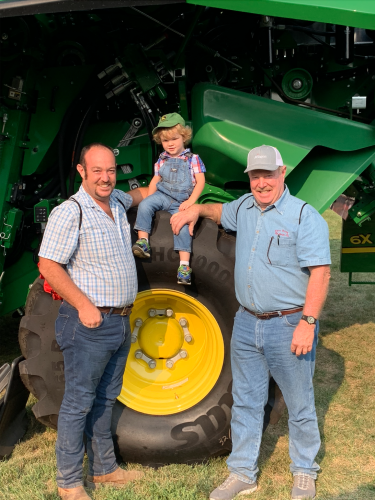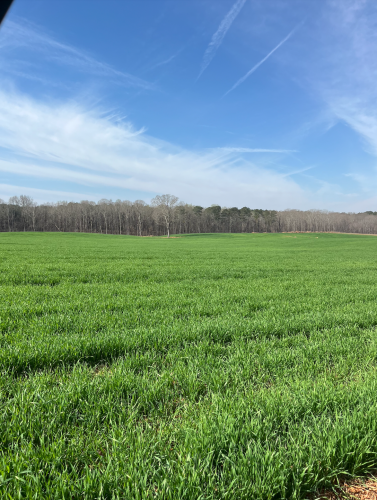Expenses just one reason why there are fewer farmers like Brubakers in county
Wheat is growing on 600 acres of row cropping land along Comer Road, but it’ll soon bear corn and soybeans.
The farm belongs to Ben Brubaker, who said he believes he is one of two or three others row cropping in Oglethorpe County. His father, Dale, also works on the farm with him.
“We’re stewards of the land,” Dale said. “All I wanna do is watch corn grow and get ready for the harvest.”
Row cropping is a farming method where crops like corn, soybeans and cotton are planted in rows allowing for efficient planting and harvesting.
While Oglethorpe County ranked 10th in total farm value in the 2021 Georgia Farm Gate Value Report, the 2017 agricultural census found that 93% of the county’s share of sales was from livestock, poultry and products, while only 7% came from crops.
“(In) the county, we just don’t have that many row croppers here,” Oglethorpe County Extension Coordinator Shanna Reynolds said in previous reporting for The Oglethorpe Echo.
Brubaker is preparing for another soybean season. The UGA Extension Office Soybean Production Guide says the optimal soybean planting date is April 1.
“Planting season is better to me than Christmas or any other time of year,” Brubaker said.
He also plans to plant corn, which is in March, and is not plentiful in the area.
It wasn’t always like this in Oglethorpe County. Commission Chair Jay Paul said row crops such as soybeans were everywhere in the 1970s and ’80s.
“I have watched these fields in my lifetime go from soybean fields, for example, to pine trees,” he said. “The pine trees have been harvested and cleared and now the fields are back in pasture. I watched a lot of transition.”
Paul maintains hope that row cropping could have a comeback and farmers could have financial success with the method.
“I’m just still old school and I would love to see it be more profitable for them again and see more soybean fields and corn fields and wheat fields in the county,” Paul said.
The reason for the decline in row cropping isn’t singular. Brubaker attributes it to a number of problems, including expenses, infrastructure and topography.
“We are feeling a lot of urban sprawl, and just our topography here, with gullies and hills and rock and everything, we just have small fields,” Brubaker said. “And to a lot of folks, the headache of it all is not worth it in this area.”
Anyone who did overcome the topographical challenges would be met with large expenses for land and equipment, Brubaker said.
“Once the old guys, so to speak, got out years ago, it is too cost prohibitive for the younger generation to get back in,” he said. “The volume of debt that it takes, even small farmers are in debt multimillion-dollar amounts. It’s easier and less stressful to just get a 9-to-5. So there’s a lot of reasons that that torch is being put down and not picked back up.”
Oglethorpe County is also a difficult place to succeed in the row cropping business because of the lack of infrastructure, like feed mills, in the area.
“We don’t have the receivers here to take our product,” Brubaker said. “In row crop country, there might be, you know, five or 10 different receiving mills within 30 miles. Here we have two.”
Despite these challenges, Ben Brubaker, who has a degree in agribusiness from the University of Georgia, has been row cropping since about 2010. He grew up with his father in the dairy business and later transitioned to poultry farming before ultimately getting into row cropping.
“I’ll be the first to admit that I couldn’t be in it in the first place if I hadn’t had the leg up of dad,” Brubaker said.
Reynolds agrees that farming is often a family affair.
“A lot of times with farming practices, it is something that is passed down through generations," she said. “They know that practice, and they know how to do it because it was a generational thing.”
The Brubaker family could see a third generation of farmers, if his two children decide to continue the tradition.
“I hope that one day, if they want to, my kids would be able to farm here,” Brubaker said. “I don’t know if that’s gonna be a possibility. I hope it is.”


